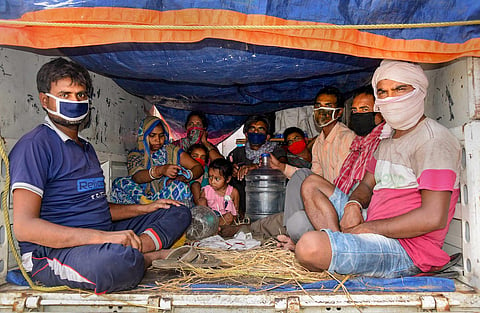

The ravages of COVID will take years to overcome. Despite this, the Union Budget 2020-21’s allocations for education, health, informal sector workers and marginalised communities didn’t see significant increases, and occasionally saw decreases despite a raging pandemic. While the poor suffered, the private sector, received significant benefits through production linked incentives and COVID-19 recovery packages. News reports suggest that government austerity measures capped expenditure by many ministries.
The government can address this gap thanks to a recent move by International Monetary Fund (IMF). On August 23, 2021 India recently received the equivalent of INR 1.3 lakh crores or $ 18 billion from the IMF as Special Drawing Rights (SDR).
The SDRs are an international reserve asset created by the IMF to supplement the official reserves of its member countries. This allocation is part of a wider move on the part of the IMF. On 2 August, 2021, the Board of Governors of the IMF approved a global allocation of SDRs equivalent to US$650 billion (about SDR 456 billion) to address the long-term global need for reserves, and help countries cope with the impact of the COVID-19 pandemic. India’s allocation is 2.6% of the overall allocation, proportionate to its share of voting rights.
The allocation seeks to address the long-term global need for reserves, foster resilience and stability of the global economy, and support liquidity-constrained countries in addressing the impact of the COVID-19 pandemic. Countries can use SDRs for any number of purposes. This could include paying for imports (improving the balance of payment); paying off debts or use them for domestic public investments (such as social protection, health, education and others) or for any kind of spending.
It is important to note that SDRs are NOT loans unlike loans from International Financial Institutions. It means they do not need to be repaid and do not get categorize as debt or borrowings. The stated purpose of the allocation is to fight the economic and social impact of the pandemic. As such, it is critical to ensure that India uses this new pool of funds for the stated purpose- to support India’s fight against the pandemic.
In India’s case, SDRs are not part of the consolidated fund of India but are credited to the RBI that augument its foreign exchange reserves. As the MoS Finance informed the Lok Sabha this week, India now has the world’s fourth largest foreign exchange reserve. India can do better then let this capital just sit idle. The government needs to eliminate any artificial legal hurdles that prevent the RBI from transferring SDRs for budget support.
There are many sectors which urgently need additional funding. Only 3% of the total economic recovery package so far has been allocated for health as the finance ministry slashed the health budget by 9.8% amidst the pandemic. This is especially important since the latest Economic Survey shows that India is ranked 179 out of 189 countries in prioritisation given to health in its government budgets. The SDR money can be invested to support India’s public health system and accelerate India’s drive to ensure free vaccines for all. This is a pain free alternative to funding vaccination through raising price of fuel.
Education was another sector which suffered massively during COVID-19. 3.2 million students have experienced the trauma of the world’s fourth longest school lockdown and most have experienced a significant loss of skills. The SDR money can help to bridge the learning gap.
As we finish almost second year into the pandemic, all such opportunities need to be leveraged to help those who need it the most – India’s poor and vulnerable. It is time for a national dialogue with all stakeholders on how to use SDRs to ensure that this much needed money benefits those who need it. The national deserves to know the government’s plans to spend this money for its citizens.
Arjun Phillips works at Oxfam India as Coordinator - International Financial Institutions (IFIs). He spearheads several advocacy initiatives around several IFIs in India for Oxfam India.